Join our list
Subscribe to our mailing list and get interesting stuff and updates to your email inbox.
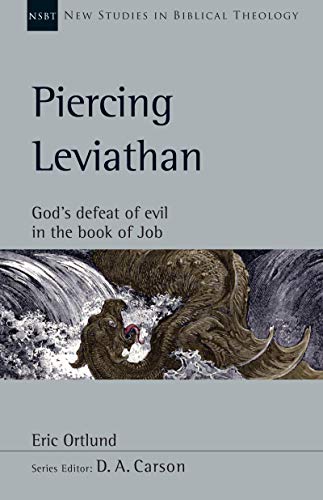
Publisher: IVP Academic
Price: $2.99
One of the most challenging passages in the Old Testament book of Job comes in the Lord’s second speech (40–41). The characters and the reader have waited a long time for the Lord to speak―only to read what is traditionally interpreted as a long description of a hippopotamus and crocodile (Behemoth and Leviathan). The stakes are very high: is God right to run the world in such a way that allows such terrible suffering for one of his most loyal servants? Is Job right to keep trusting God in the midst of much criticism? But it is difficult for modern readers to avoid a sense of frustrating anticlimax as the book ends.
Eric Ortlund argues that Behemoth and Leviathan are better understood as symbols of cosmic chaos and evil―that a supernatural interpretation fits better exegetically within the book of Job and within Job’s ancient Middle Eastern context. It also helps modern readers to appreciate the satisfying climax the narrator intended for the book: in describing Behemoth and Leviathan, God is directly engaging with Job’s complaint about divine justice, implying to Job that he understands the evil at loose in his creation better than Job does, is in control of it, and will one day destroy it.

Publisher: IVP Academic
Price: $2.99
We’re told that freedom and opportunity are our ticket to the good life. Get out there and follow your dreams! Be the hero of your own story! Find your happiness! Live your best life! It seems that limitless possibilities await anyone with vision and willingness to hustle their way through life.
The thing is, instead of resulting in a sense of accomplishment, this limitlessness merely has us doing more and trying harder―leaving us depleted and dissatisfied. With life and faith.
Ashley Hales invites us to a better way: a more spacious life. Contrary to what we’ve believed, the spacious life is not found in unfettered options or accomplished by our hustle and hurry. The life we crave is found within the confines of God’s loving limits. Ashley helps us recognize that when we live within these boundaries, we discover a life filled with purpose, joy, and rest.
This is the spacious life―finding true freedom within the good limits given to us by our good God.
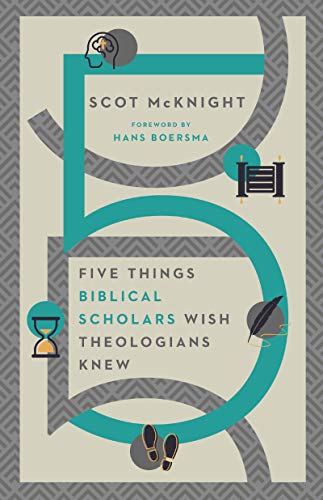
Author(s): Scot McKnight
Publisher: IVP Academic
Price: $2.99 DEAL EXPIRED
The disciplines of biblical studies and theology should serve each other, and they should serve both the church and the academy together.

Author(s): Hans Boersma
Publisher: IVP Academic
Price: $2.99
The disciplines of theology and biblical studies should serve each other, and they should serve both the church and the academy together. But the relationship between them is often marked by misunderstandings, methodological differences, and cross-discipline tension.
Theologian Hans Boersma here highlights five things he wishes biblical scholars knew about theology. In a companion volume, biblical scholar Scot McKnight reflects on five things he wishes theologians knew about biblical studies.
With an irenic spirit as well as honesty about differences that remain, Boersma and McKnight seek to foster understanding between their disciplines through these books so they might once again collaborate with one another.
 Author(s): Ron Highfield
Author(s): Ron HighfieldPublisher: IVP Academic
Price: $2.99 (Mar 14-15)
Does God’s all-encompassing will restrict our freedom? Does God’s ownership and mastery over us diminish our dignity?
The fear that God is a threat to our freedom and dignity goes far back in Western thought. Such suspicion remains with us today in our so-called secular society. In such a context any talk of God tends to provoke responses that range from defiance to subservience to indifference. How did Western culture come to this place? What impact does this social and intellectual environment have on those who claim to believe in God or more specifically in the Christian God of the Bible?
Professor of religion Ron Highfield traces out the development of Western thought that has led us our current frame of mind from Plato, Augustine and Descartes through Locke, Kant, Blake Bentham, Hegel, Nietzsche–all the way down to Charles Taylor’s landmark work Sources of the Self. At the heart of the issue is the modern notion of the autonomous self and the inevitable crisis it provokes for a view of human identity, freedom and dignity found in God. Can the modern self really secure its own freedom, dignity and happiness? What alternative do we have? Highfield makes pertinent use of trinitarian theology to show how genuine Christian faith responds to this challenge by directing us to a God who is not in competition with his human creations, but rather who provides us with what we seek but could never give ourselves.
God, Freedom and Human Dignity is essential reading for Christian students who are interested in the debates around secularism, modernity and identity formation.
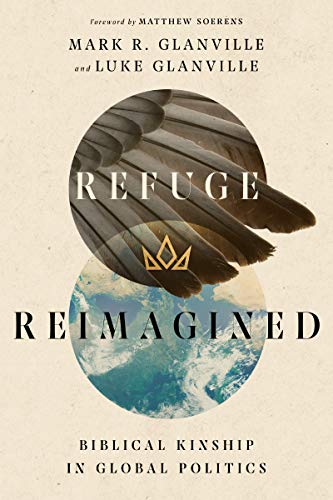 Author(s): Mark R. Glanville & Luke Glanville
Author(s): Mark R. Glanville & Luke GlanvillePublisher: IVP Academic
Price: $2.99 (Feb 7-8)
The global crisis of forced displacement is growing every year. At the same time, Western Christians’ sympathy toward refugees is increasingly overshadowed by concerns about personal and national security, economics, and culture. We urgently need a perspective that understands both Scripture and current political realities and that can be applied at the levels of the church, the nation, and the globe.
In Refuge Reimagined, Mark R. Glanville and Luke Glanville offer a new approach to compassion for displaced people: a biblical ethic of kinship. God’s people, they argue, are consistently called to extend kinship―a mutual responsibility and solidarity―to those who are marginalized and without a home. Drawing on their respective expertise in Old Testament studies and international relations, the two brothers engage a range of disciplines to demonstrate how this ethic is consistently conveyed throughout the Bible and can be practically embodied today.
Glanville and Glanville apply the kinship ethic to issues such as the current mission of the church, national identity and sovereignty, and possibilities for a cooperative global response to the refugee crisis. Challenging the fear-based ethic that often motivates Christian approaches, they envision a more generous, creative, and hopeful way forward. Refuge Reimagined will equip students, activists, and anyone interested in refugee issues to understand the biblical model for communities and how it can transform our world.
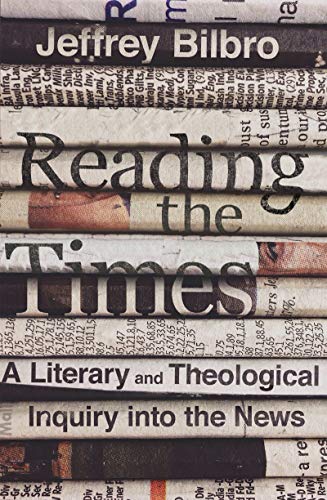
Publisher: IVP Academic
Price: $5.99 (Ends Jan 31)
“Reading the morning newspaper is the realist’s morning prayer.”―G. W. F. Hegel
Whenever we reach for our phones or scan a newspaper to get “caught up,” we are being not merely informed but also formed. News consumption can shape our sense of belonging, how we judge the value of our lives, and even how our brains function. Christians mustn’t let the news replace prayer as Hegel envisioned, but neither should we simply discard the daily feed. We need a better understanding of what the news is for and how to read it well.
Jeffrey Bilbro invites readers to take a step back and gain some theological and historical perspective on the nature and very purpose of news. In Reading the Times he reflects on how we pay attention, how we discern the nature of time and history, and how we form communities through what we read and discuss. Drawing on writers from Thoreau and Dante to Merton and Berry, along with activist-journalists such as Frederick Douglass and Dorothy Day, Bilbro offers an alternative vision of the rhythms of life, one in which we understand our times in light of what is timeless. Throughout, he suggests practices to counteract common maladies tied to media consumption in order to cultivate healthier ways of reading and being.
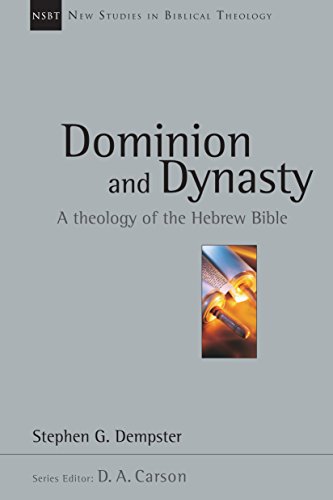 Author(s): Stephen G. Dempster
Author(s): Stephen G. DempsterPublisher: IVP Academic
Price: $2.99 (Jan 17-18)
Christian theologians rarely study the Old Testament in its final Hebrew canonical form, even though this was very likely the Bible used by Jesus and the early church. However, once read as a whole, the larger structure of the Hebrew Bible (Tanakh) provides a “wide-angle lens” through which its contents can be viewed.
In this stimulating New Studies in Biblical Theology volume, Stephen G. Dempster argues that, despite its undoubted literary diversity, the Hebrew Bible possesses a remarkable structural and conceptual unity. The various genres and books are placed within a comprehensive narrative framework which provides an overarching literary and historical context. The many texts contribute to this larger text, and find their meaning and significance within its story of “dominion and dynasty,” which ranges from Adam to the Son of Man, from David to the coming Davidic king.
Addressing key issues in biblical theology, the works comprising New Studies in Biblical Theology are creative attempts to help Christians better understand their Bibles. The NSBT series is edited by D. A. Carson, aiming to simultaneously instruct and to edify, to interact with current scholarship and to point the way ahead.


